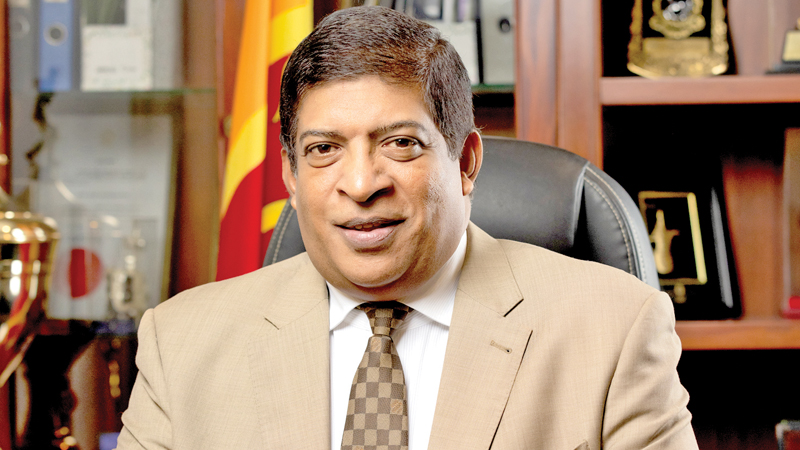 In a candid interview with the Sunday Observer, Former Finance Minister Ravi Karunanayake, the Colombo District Leader of the United National Party (UNP), said that the upcoming Presidential election is about a battle between maturity and experience versus the untested and theoretical. He added that it is not a time for experimentation because Sri Lanka is on a winning streak under President Ranil Wickremesinghe and the citizens will stand with him to secure final victory.
In a candid interview with the Sunday Observer, Former Finance Minister Ravi Karunanayake, the Colombo District Leader of the United National Party (UNP), said that the upcoming Presidential election is about a battle between maturity and experience versus the untested and theoretical. He added that it is not a time for experimentation because Sri Lanka is on a winning streak under President Ranil Wickremesinghe and the citizens will stand with him to secure final victory.
Q. What do the internal polls tell you about the support for the candidates? Who’s leading?
A. I would leave the polls aside, but the ground feeling and the feel- good factor in the environment is that there is growing sense of optimism among the public. While numbers may fluctuate, the general sentiment is that the country is finally moving in a positive direction. It hasn’t been an easy journey, but things are undeniably better than they were two years ago. As memories of tougher times begin to fade, there’s a collective acknowledgement, even among those who may not be fans of Ranil, that he has made a tangible impact.
This momentum is building steadily, creating a snowball effect of progress. The prevailing mood suggests that people are cautious about experimenting with change at this stage. There’s a sense that now is not the time for trial and error, but for steady, continuous improvement.
Q. Certain online polls shows Anura Kumara is leading? What do you think about it?
A. While certain polls might indicate Anura Kumara is leading, it’s important to acknowledge that different polls often show varying results.
Some may point to Ranil, while others highlight different contenders. Polls can be complex and often contradict one another, so relying solely on these scientific approaches can be misleading.
What truly matters is the sentiment on the ground, the genuine desires and feelings of the people. The youth, women, and more experienced voters all have unique perspectives, and each group’s expectations and concerns differ. That’s the real challenge, to cater to these diverse needs.
In the case of Ranil, there’s a noticeable shift in public perception. People are increasingly recognising his leadership, especially given the progress seen in recent times.
There’s a sense of stability and continuity that resonates, especially when it comes to ensuring that hard-earned progress isn’t jeopardised. His experience and ability to move through tough times have earned him respect, and for many, that sense of security is key as they weigh their options for the future.
Q. Where do you think the young people’s vote lie?
A. Six months ago, young people were eager for a fresh, new approach, wanting to explore different avenues and bring about change. However, now there’s a growing realisation that such experimentation could be risky. The mood has shifted. Rather than backing a candidate who might make abrupt changes, the youth are beginning to see the value in the steady progress being made under Ranil Wickremesinghe.
They’ve come to understand that this is not a time for drastic shifts or uncertainty. The country is on a path toward recovery, and Ranil’s leadership has provided a sense of direction and stability.
Many young people are now gravitating towards him, recognising that a stable future is more important than experimenting with untested alternatives.
The momentum he has built resonates with their desire for long-term improvement, rather than a disruptive process.
Youth are the future of the country, and their growing disillusionment with politicians has created a rift between the political class and the general public. To bridge this gap, we need to restore confidence in democracy and ensure that Sri Lanka’s future is brighter than today. This confidence must be instilled through leading by example, not through rhetoric that says “do as I say, not as I do.”
Ranil Wickremesinghe has addressed these issues head-on. He didn’t create the bankruptcy; he inherited it and had to work with a team not of his choosing to turn things around. Despite the challenges, he is focused on delivering results and steering Sri Lanka towards victory.
The youth, who felt abandoned a few years ago, are now witnessing a recovery process. They want stability and to avoid a repeat of the crisis from 25 months ago. It’s crucial to work towards their aspirations, making them a cornerstone of the effort to secure a safer and more prosperous future for the country.
Q. What are the biggest drawbacks of the policies in SP’s and AKD’s manifestos?
A. When you look at the policies in the manifestos of Sajith Premadasa (SP) and Anura Kumara Dissanayake (AKD), there are significant concerns.
If you consider all 38 candidates opposing Ranil Wickremesinghe, they all have stories to tell. However, only Ranil has a plan that can truly start from the 22nd, because he’s already doing the job and will continue to do so.
His manifesto is ready to be in action immediately, representing the will of the people. It’s a working document, whereas the others are more wishful documents, that’s the salient difference.
Premadasa’s approach revolves around cost-free spending, with no clear limits in sight. This lack of restraint is alarming, as it doesn’t take into account the economic realities the country faces. On the other hand, Dissanayake proposes reducing revenues while simultaneously increasing costs, which creates a serious imbalance.
Both these approaches are reminiscent of what happened in 2019, during the last Presidential election, when Gotabaya Rajapaksa was elected. At that time, VAT was reduced by 8 percent, leading to a loss of 640 billion rupees, setting the stage for the country’s bankruptcy within six to seven months.
There’s no sound economic methodology behind cutting income while increasing expenditure. This would only worsen the budget deficit, just as it did before. The idea that you can reduce costs and revenue while keeping the economy stable is unrealistic.
This is why Ranil Wickremesinghe’s approach seems more balanced and pragmatic. His policies are carefully managed and articulate a plan to stabilise the economy, in contrast to the more speculative approaches of SP and AKD.
Q. How does President Wickremesinghe’s manifesto address the woes of the people ?
A. President Wickremesinghe’s manifesto addresses the people’s concerns by focusing on restoring financial discipline and ensuring economic recovery.
One of the first major actions was related to taxes. After the country went bankrupt, the IMF insisted on financial discipline, aiming to increase revenues from 8.2 percent to 15 percent within three years, and to 17% by 2030. This led to an initial increase in taxes, but the plan now involves reducing taxes and pay cuts as the economy strengthens.
Wickremesinghe has also laid out a plan for managing Sri Lanka’s heavy debt burden. While the country isn’t currently repaying loans, payments will intensify from 2028 to 2032. To handle this, Wickremesinghe’s strategy is to “export the debt out of the system.” The idea is to generate enough revenue through exports and economic growth to pay off the debt.
His manifesto also emphasises the modernisation of education, ensuring the younger generation no longer relies on politicians for their future. Instead, Wickremesinghe envisions a strong economy with a million young entrepreneurs who can connect with global markets and help drive growth.
In terms of healthcare, his plan includes modernisation and digitisation to streamline services and eliminate waste, thereby improving efficiency and reducing costs. This is part of a broader effort to eradicate inefficiencies in the economy, which are counterproductive and waste both time and resources.
The President’s focus is on long-term economic recovery, which, in turn, lessens the burden on the people. There’s a growing understanding among the public that the era of expecting everything for free is over. The focus now is on managing limited resources to meet the country’s needs.
Sri Lanka is a nation in poverty surrounded by prosperity, it needs to capitalise on its strategic location. By aligning itself as a regional partner with India that is projected to reach a $10 trillion GDP: Sri Lanka can benefit even if it taps into just 2-3 percent of that growth. This would significantly boost Sri Lanka’s economy and ensure a prosperous future.
Q. So the manifesto prioritises anti-corruption measures and there are members of certain political alliances that are with RW at the moment. So there’s this conflict where how we can ensure accountability?
A. Ranil Wickremesinghe has always stood for a no-nonsense approach, and that will continue into the future. What he aims to do is ensure we walk the talk. There’s a lot of rhetoric, but the judiciary should handle the judicial aspect, and the political side is where laws are made for it.
The key is to ensure that these laws are applied in a genuine manner. It’s easy for the media to create a storm in a teacup, but at the end of the day, the reality has to be translated into practical actions. As for Ranil, he cares two hoots for anybody, as long as the law takes its course.
Q. Why should Ranil Wickremesinghe be given another chance?
A. Ranil Wickremesinghe should be given another chance because, 25 months ago, when the country was in flames and facing a leadership crisis, he stepped up when no one else would. At that time, people were starving, the lights were out, the roads were empty, and children were crying without milk. There was no medicine, no gas, no foreign exchange, and the nation was in complete disarray. Everyone was looking out for their own interests, but Wickremesinghe took on the crisis.
In just 25 months, he was able to stabilise the country, gain both national and international support, and bring Sri Lanka back to a place where it could pay its loans. The economy is now stronger, the world recognises Sri Lanka as a trading nation, and market access has been restored. Not everyone can step into the global arena and get things moving, but Wickremesinghe did.
This is not the time for experimentation. The task at hand is being accomplished, step by step. It’s like being in a match heading for victory, and suddenly you’re asked whether to continue or stop.
Sri Lanka is on a winning streak, and to secure final victory, experience, knowledge, and the ability to put the country on the world map are essential. Wickremesinghe has proven that when the going gets tough, the tough get going.
With 38 opponents primarily from L board operations, the choice is between maturity and experience versus the untested and theoretical. Sri Lanka, having emerged from bankruptcy, needs a steady hand, not an experimental approach. It’s akin to entrusting a child in need of surgery to the most experienced surgeon rather than an untested one.
While general elections might offer a mix of diverse options, the immediate need is clear: experience and proven capability are crucial for guiding the country to a better tomorrow.
That’s why Ranil Wickremesinghe is running independently with the gas cylinder as his symbol. His goal is to depoliticise the process and garner widespread support for moving Sri Lanka forward.




